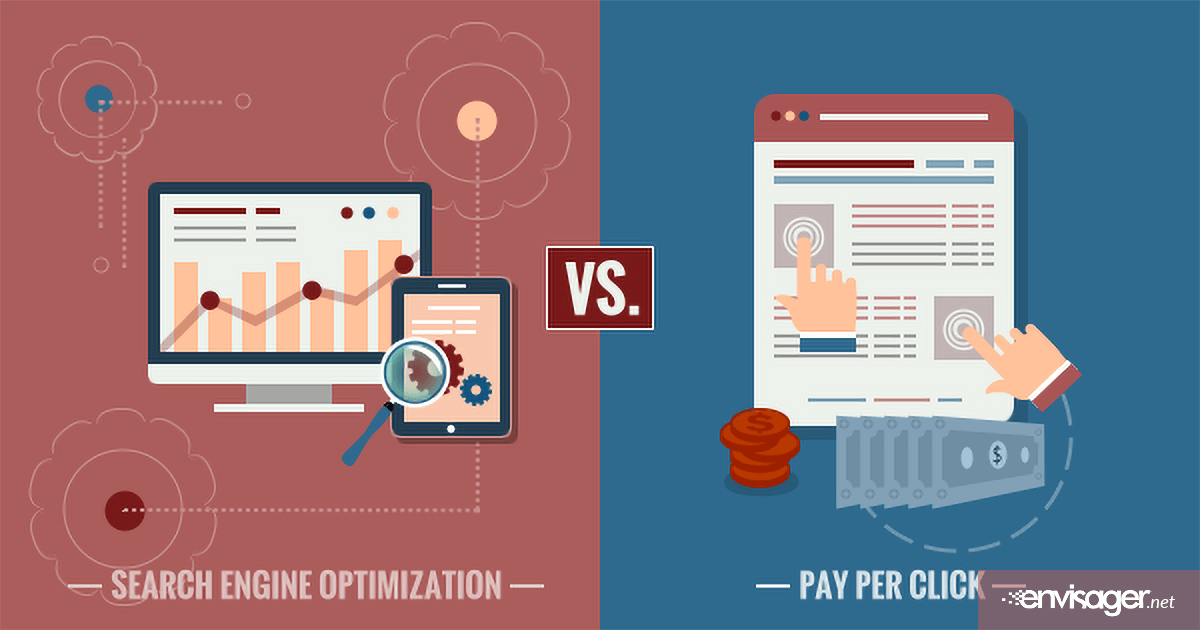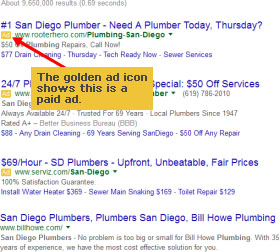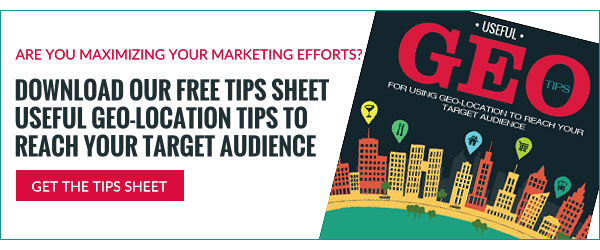SEO vs. PPC: Which Is Better For Your Business?

SEO versus PPC – which is better for my business: Pay-Per-Click (PPC) ads or an organic Search Engine Optimization (SEO) strategy? I get that question a lot. And each time, my answer is, It depends. What are your goals?
No, it’s not a straight ‘yes’ or ‘no’ answer because the answer is considerably dependent on what your company goals are. Does your product or service involve a great deal of education prior to purchasing? Are you established in your industry? Are you selling a new product or service? These are just a few of the questions you need to address before diving into SEO or PPC.
Let’s first take a quick look at the difference between PPC and SEO.
SEO vs. PPC Analysis
PPC (Pay-Per-Click) is all about paying for advertising space for specific targeted keywords on search results pages. It’s a form of internet marketing in which advertisers pay a fee each time one of their ads is clicked. Essentially, it’s a way of buying visits to your site, rather than attempting to earn those visits organically. But guess what? There’s a great deal of search engine optimization when creating a paid ad campaign.

Take a look at this screenshot of a Google search for the phrase Plumber San Diego. The PPC ads show at the top of the search results page with the golden tag labeled Ad. Below the top ad space you will see the natural search (SEO) results displayed in the main area of the search results page.
The screenshot clearly reveals that you can pay for presence on keyword phrases through PPC or you can earn your presence with SEO.
SEO, on the other hand, the purpose is optimizing your website and content to rank higher in organic search results for targeted keywords on the most impactful search engines. It’s also about being a thought leader in your industry; an authority who has the solution to the problem at hand. The major search engines such as Bing, Google, and Yahoo inspect your site to see if other websites are linking to your web pages, how visitors interact with your site, if they come back, and many other factors.
Does PPC Provide Better Value Than Organic SEO?
Again, it depends on your company’s web marketing goals. But, here are a few facts why organic SEO is chosen over PPC:
1. More users trust organic listings. Statistics from SERPs behavior studies show that, 77% of search users choose organic over paid listing when searching, 67% choose organic search when purchasing.
2. Because they are paid ads, they are less appealing. Studies show that organic results are 8.5x more likely to be clicked on than paid search results.
3. Unlike SEO that once done keeps working for you, PPC requires constant investment, optimizing and testing to keep the performance up.
There’s tons of data indicate that Natural Search visitors to websites are far more likely to trust your business, trust you, and your products and services. Let’s face it, it not easy ranking high in Google for keywords that are common to thousands of businesses in the same industry. So, being able to accomplish ranking highly for those keywords signals a searcher that you’re a credible source and a key player in your industry.
SEO is NOT free. It comes at a cost. Perhaps not as costly as PPC ads, nevertheless you will pay for SEO too. Whether you’re paying a professional SEO firm to optimize your site or your time to do it yourself, there is a cost for SEO.
When To Use PPC
Incidentally, it’s named Pay-Per-Click (PPC) because you have to pay for every user who clicks on the ad you are promoting.
There are several popular PPC systems such as Google AdWords, Facebook advertising platform, and Yahoo Advertising.
Below are some situations when PPC would prove highly beneficial for an online business:
When promoting a time-sensitive offer – When marketing events, products or services that contains an expiration date you’re racing against time. Given that SEO campaigns usually have long gestation period that would produce belated results, the expedience of PPC marketing would be perfect. For example, if you’re promoting an offer that will end in 3 days, PPC can deliver the traffic you need in just a few minutes.
When you’re seeking immediate results – Provided that your bids are high enough to merit priority placement, from the moment your PPC campaign is approved, your ads will immediately be displayed for millions of people to see. You can practically count the minutes before a rush of visitors come cascading to your pages.
When your goal is highly targeted traffic – Unlike SEO, PPC’s true strengths are its speed and expansiveness. With PPC you can narrow down your prospects based on their demographic data. For example, Facebook advertising platform allows you to promote to the age range, gender, income bracket, hobbies, education level, and even marital status of the people who will be able to view your ad. These make PPC a powerful way of reaching the narrow band of people your business needs, and leading them to your web pages.
In Conclusion
In response to the original question, Which is better for my business: Pay-Per-Click (PPC) ads or an organic Search Engine Optimization (SEO) strategy?, my answer is still the same: It depends.
Pay-Per-Click can help quickly identify your best performing keywords and quick-start your business’ digital marketing efforts with immediate traffic. I recommend that you take the time to get proper training on how to use PPC in order to get the most of it. Whether you decide to manage your PPC campaigns or prefer to hire a professional PPC marketing firm that can manage it full time, when do right, PPC campaigns can get very expensive, very quickly. Beware that when you turn off PPC, the traffic goes away too.
Search Engine Optimization is extremely important for online businesses. To be indexed for the right search terms and build page authority, it takes time and patients. But, the payoff is well-worth the effort because statistics show that 80% of the traffic that can be generated for any website will come from the search engines.
It can seem like an endless journey, but don’t be discouraged, because a long term SEO strategy will increase your chances of ranking well in the organic listings, get you long term good traffic, and bring you the most qualified leads.
When done correctly, both PPC and organic SEO can get you on the front page of the search engines for targeted terms. They are complementary parts of an online marketing strategy. However, each has its respective benefits and costs.

Hazel Burgess
FOUNDER/SEO DIRECTOR
Hazel is the Founder & SEO Director at Envisager Studio, a premier website design agency specializing in WordPress website design, development and internet marketing. In her spare time, she writes about search engine optimization, website design, and internet marketing.



